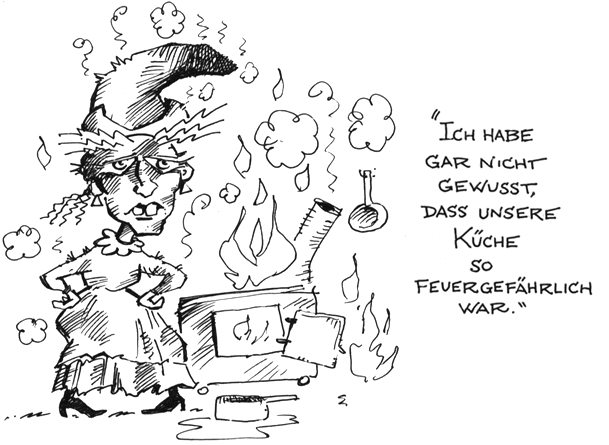5.5.1.6: Conversational past of mixed verbs
- Page ID
- 108126
Verbs:Das Perfekt - Gemischte Verben
The participle forms of verbs can be used to build the conversational past, the past perfect and the subjunctive mood. They can also be used as adjectives. The conversational past is used just like the English simple past.
| die böse Königin | Was ist los? | What's wrong? |
| die Hexe | Ich habe nicht gedacht, dass meine Katze in der Küche war ... | I thought my cat was not in the kitchen ... |
| die böse Königin | Hmmm ... Wieso hast du das nicht gewusst? Du bist doch eine Hexe! | How come you didn't know that? You are a witch, after all! |
| die Hexe | Eben! Ich habe mich nur eine Sekunde vom Kessel gewandt ... Die Küche hat so schnell gebrannt!!! Ich habe gar nicht gewusst, dass unsere Küche so feuergefährlich war ... | Exactly! I only turned away from the cauldron for a second ... The kitchen burned so fast!!! I didn't know that our kitchen was so inflammable ... |
| die böse Königin | Um Gottes Willen! Das war doch die fünfte Katze dieses Jahr!!! | For Pete's sake! That was the fifth cat this year!!! |

A handful of German verbs are mixed because they show similarities with both regular verbs and irregular verbs when forming the participle. They take the ge- prefix and the -t suffix (like regular verbs) but go through a stem-vowel – and possibly a consonant – change (like irregular verbs):
| 1) take the infinitive | bringen (bring) | ||
| 2) remove the | -en | suffix | bring |
| 3) change the stem vowel (and/or consonant) | brach | ||
| 3) add | -t | suffix | bracht |
| 4) add | ge- | prefix | gebracht |
| brennen (burn) | => | hat gebrannt |
| bringen (bring) | => | hat gebracht |
| denken (think) | => | hat gedacht |
| kennen (know) | => | hat gekannt |
| nennen (name, call) | => | hat genannt |
| rennen (run) | => | ist gerannt |
| senden (send, air – e.g. TV) | => | hat gesandt (this can also be regular: hat gesendet) |
| wenden (turn) | => | hat gewandt (this can also be regular: hat gewendet) |
| wissen (know) | => | hat gewusst |
Mixed verbs with separable/inseparable prefixes
In the presence of separable prefixes, these mixed verbs keep the exact same participle forms:
| abbrennen (burn down) | ist abgebrannt |
| mitbringen (bring along) | hat mitgebracht |
| nachdenken (think about) | hat nachgedacht |
| wegrennen (run away) | ist weggerannt |
If the prefix is inseparable, the participle of the mixed verbs drops the ge- prefix:
| bekennen (confess, admit mistake) | hat bekannt |
| entsenden (dispatch, send out) | hat entsandt |
| erdenken (make up a story, imagine) | hat erdacht |
| verwenden (use up time, use) | hat verwandt (verwendet) |


